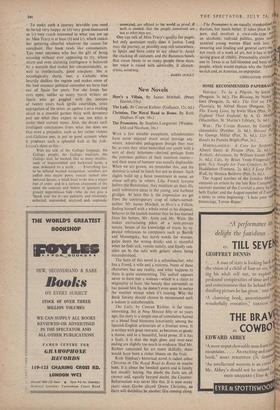New Novels
Here's a Villain. By James Mitchell. (Peter Davies, 15s.) The Promoters. By Stephen Longstreet. (Weiden- feld and Nicolson, 16s.) WITH a few notable exceptions, schoolmasters have never enjoyed much social prestige any- where. Admirable pedagogues though they may be, as men they often bedevilled our youth with a sort of dusty bitterness—derived perhaps from the pointless politics of their common rooms— and their sense of humour was usually deplorable. When we are grown, we remember this, and the dominie is asked to lunch but not to dinner. Such slights build up a fierce resentment in some, an otiose self-pity in others. Like French lawyers before the Revolution, they meditate on their ills, instil subversive ideas in 'the young, and harbour grudges. At least this is the impression we get from the contemporary crop of ushers-turned- author. Mr. James Mitchell, in Here's a Villain, finding himself with a whole novel at his disposal, behaves in the loutish manner that he has learned from his betters, Mr. Amis and Mr. Wain. He makes excruciating jokes of a semi-private nature, boasts of his knowledge of music by re- peated references to composers such as Bartok and Mussorgsky, has harsh words for women. gulps down the wrong drinks and is resentful when he feels sick, vomits noisily, and finally sub- sides on to the sofa with groans about being misunderstood.
The hero of this novel is a schoolteacher, who has a friend, a wife and a mistress. None of these characters has any reality, and what happens to them is quite uninteresting. The author appears never to have met a woman—which is a claim to originality at least; the beauty that surrounds us has passed him by, he doesn't even seem to notice the weather except when it's raining. Why the Book Society should choose to recommend such a tedium is unfathomable.
The Lady, by Conrad Richter, is far more interesting. Set in New Mexico fifty or so years ago, the story is a simple one of cumulative hatred as a blood feud blossoms luxuriantly among the Spanish-English aristocrats of a frontier town. It is written with great restraint, as becomes so gaudy a theme, and in a beautiful, lucid prose. If it has a fault, it is that the high gloss and over-neat ending are slightly too much in evidence. Had Mr. Richter concealed his art more skilfully, there would have been a richer bloom on the fruit.
Ruth Stephan's historical novel is called either Christina or The Royal Road to Rome or maybe both. It is about the Swedish queen and is faintly but steadily boring. No doubt the facts are all correct and, equally beyond doubt, the Counter- Reformation was never like this. It is now many years since Garbo played • Queen Christina, so there will doubtless be another film coming along. The Promoters is an equally standardised duction, but much better. It takes place in
an alcoholic, railroad politics, green cadill now, and involves a coca-cola-type assorted young women filled with lust, swearing and feuding and general carry-ont, not much of a work of art, but it has at least saving grace of vitality. Presumably almost 0 one in Texas is as full-blooded and busy as people, which would explain why the Texan so rich and, in America, so unpopular.
(Irr CONSTANTINE FITZ00 the






























 Previous page
Previous page